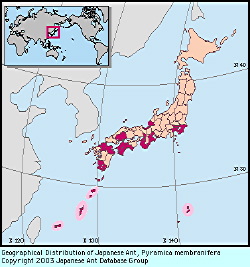
|
species
|
Pyramica membranifera
|
 |

|
|
|
Japanese Name
|
Tokara-uroko-ari
|
Original Reference
|
|
Emery, C. (1869) Enumerazione dei Formicidi che rinvengonsi nei contorni di Napoli. Annali dell'Accademia degli Aspiranti Naturalisti (2) 2: 1-26.
|
Synonym
|
|
Strumigenys (Trichoscapa) membranifera Emery, 1869,
Strumigenys membranifera r. simillima Emery, 1890,
Strumigenys membranifera var. santschii, Forel, 1904,
Strumigenys (Cephaloxys) membranifera Emery: Emery, 1916,
Strumigenys (Cephaloxys) vitiensis Mann, 1921,
Strumigenys (Cephaloxys) silvestriana Wheeler, 1928,
Strumigenys (Cephaloxys) foochowensis Wheeler, 1928,
Strumigenys (Cephaloxys) membranifera var. marioni Wheeler, 1933,
Strumigenys (Cephaloxys) membranifera var. williamsi Wheeler, 1933,
Trichoscapa membranifera (Emery): Brown, 1948,
Pyramica membranifera (Emery): Bolton, 1999,
|
Description
|
|
Total length of workers around 2 mm. Body color yellowish brown. Pilosity almost lacking except for a pair of erect scale-like hairs on posterior portion of head.
|
Remarks
|
|
P. membranifera is an accomplished tramp species. It has been recorded widely from tropical and warm temperate regions of the world. Brown & Wilson (1959) suggested an African origin, but this was questioned by Bolton (1983). This species is found in the soil of rather open habitats. Japanese records are generally from the south, ranging northwards to southern Honshu. The most northern record is from Tokyo (Kubota & Terayama, 1988). Wilson (1954) reported P. membranifera feeding on a wide range of small soft-bodied arthropods.
|
|

Distribution
|
|
Honshu (Kanto District and southwards), Shikoku, Kyushu, Ogasawara Is, Nansei Is; Mainland China, Taiwan, Samoa, Hawaii, Fiji, Africa, S Europe (Italy), N America, W Indies.
|
|
References
|
|
- Enumerazione dei Formicidi che rinvengonsi nei contorni di Napoli. Annali dell'Accademia degli Aspiranti Naturalisti (2) 2: 1-26.
- Studi sulle formiche della fauna neotropica. Bullettino della Societˆ Entomologica Italiana 22: 38-80.
- Forel, A. 1904. Miscellanea myrmŽcologiques. Rev. Suisse Zool., 12: 1-52.
- Emery, C. 1916 ("1915"). Fauna entomologica italiana. I. Hymenoptera.-Formicidae. Bull. Soc. Entomol. Ital., 47: 79-275.
- Mann, W. M. 1921. The ants of the Fiji Islands. Bull. Mus. Comp. Zool., 64: 401-499.
- Wheeler, W. M. (1928). Ants collected by Professor F. Silvestri in Japan and Korea. . Boll. Lab. Zool. Gen. Agrar. Portici, 21, 96-125.
- Wheeler, W. M. 1933. An ant new to the fauna of the Hawaiian Islands. Proc. Hawaii. Entomol. Soc., 8: 275-278.
- Brown, W. L., Jr. (1948). A preliminary generic revision of the higher Dacetini (Hymenoptera: Formicidae). Trans. Am. Ent. Soc., 74, 101-129.
- Bolton, B. 1999. Ant genera of the tribe Dacetonini (Hymenoptera: Formicidae). J. Nat. Hist., 33: 1639-1689.
- Brown, W. L., Jr. & E. O. Wilson (1959). The evolution of the dacetine ants. . Quart. Rev. Biol., 34, 278-294.
|
Editor
|
|
Original text by Kazuo Ogata and Keiichi Onoyama. English translation by Kazuo Ogata, edited by Robert W. Taylor. Revised by Masashi Yoshimura.
|
|